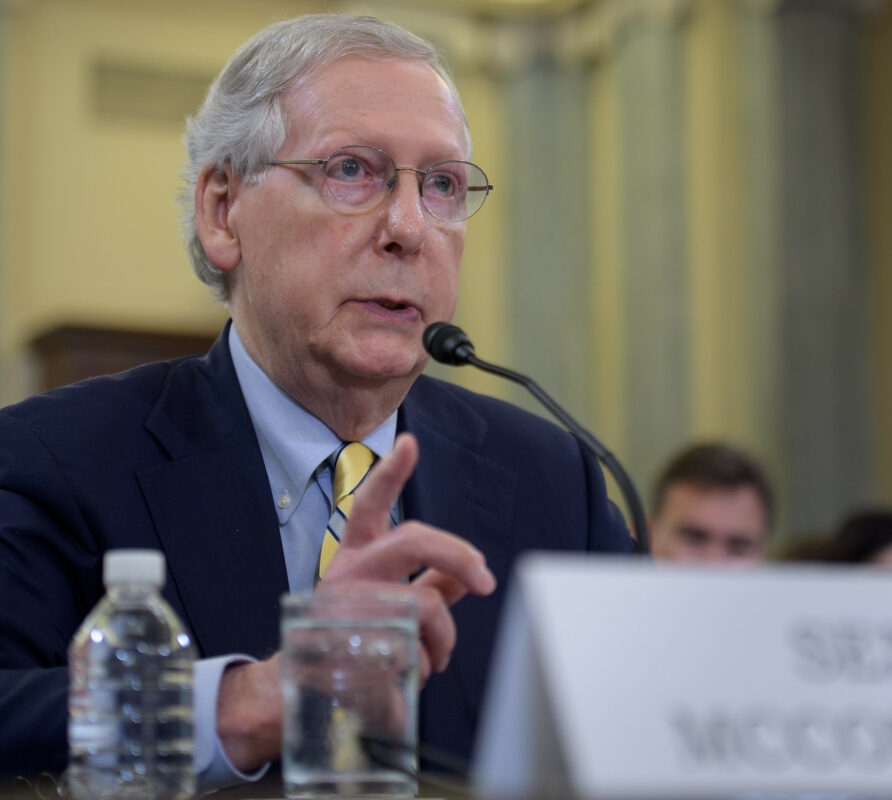Senate Republicans breathed a sigh of relief several weeks ago when Pennsylvania state Sen. Doug Mastriano announced he was taking a pass on running for the Keystone State’s Senate seat. A forced birther MAGA extremist, he imploded last year as Republicans’ gubernatorial nominee. That makes the Senate GOP nomination path of hedge fund manager David McCormick, the Mitch McConnell wing’s preferred candidate, much more promising should he decide to run.
Senate Republicans have similar hopeful storylines in other target states as well. In Ohio, Rep. Warren Davidson, a Freedom Caucus right-winger, decided to sit out the ’24 Senate race, to the great relief of GOP recruiters. In West Virginia, McConnell successfully wooed his favored candidate, Gov. Jim Justice, into the race, though Justice still faces a bitter primary fight with the Club for Growth-backed Rep. Alex Mooney.
It’s been a relatively good run for a Republican caucus that completely squandered its chance to retake the Senate majority last cycle. Yet danger lies just below the surface of these seemingly positive developments.
Despite those dodged bullets, GOP base voters still have the final say and Senate Republicans are wildly out of step with them. In Wisconsin, for instance, Republicans are pressing Rep. Mike Gallagher to toss his hat in the ring for a chance to unseat Democratic Sen. Tammy Baldwin. But a recent PPP survey puts Gallagher 20 points behind MAGA extremist and disgraced former Milwaukee County Sheriff David Clarke in the Republican primary (Clarke 40%, Gallagher 20%, Tom Tiffany 10%, and Eric Hovde 3%).
Clarke, a conspiracy theory enthusiast and diehard Trump supporter, is reportedly eyeing a bid.
But even candidates aligned with the McConnell wing of the party, like Gallagher, are still far right of the American mainstream, particularly in a national environment where Republican lawmakers across the country are decimating reproductive freedom.
Gallagher is a cosponsor of the Life at Conception Act, a total national abortion ban that includes no exceptions for rape or incest. Abortion rights advocates also criticize the legislation as an opening salvo against access to contraception and fertility treatments such as in vitro fertilization.
So if Gallagher were to win the nomination, he would be running on an outright abortion ban in a state where Democrats successfully used the issue two months ago to throttle Republicans with an 11-point victory in a special election for a critical state Supreme Court seat. Just imagine how the abortion policies of Senate Republicans’ “mainstream” candidate will likely play in next year’s general election.
McCormick faces similar trouble in Pennsylvania. During last year’s Republican primary for the state’s other Senate seat, McCormick praised the Supreme Court decision overturning Roe v. Wade and favored outlawing abortions with “very rare” exceptions for the life of the mother.
In short, Senate Republicans have a real national narrative problem even if they manage to avoid the worst-of-the-worst candidates in some Senate battleground states such as Wisconsin and Pennsylvania. Ohio Republicans, for instance, are busy trying to short-circuit citizen-led ballot initiatives to make it nearly impossible for Buckeye State voters to enshrine abortion rights in the state’s constitution. So it’s against that backdrop that the Republican nominee will take on the state’s incumbent Democratic Sen. Sherrod Brown. And two of the three Republicans already running support abortion bans, one without exceptions for rape or incest and the other with no exceptions for anything (including the life of the mother).
For their part, Democrats have strong incumbents in the Senate battleground states, including Sens. Baldwin in Wisconsin, Brown in Ohio, Bob Casey in Pennsylvania, Jon Tester in Montana, and Jacky Rosen in Nevada. The two wild cards are Sen. Joe Manchin of West Virginia, who hasn’t committed to running yet, and Sen. Kyrsten Sinema of Arizona, who plans to run as an independent while Rep. Ruben Gallego aims to be the Democratic nominee.
In addition to abortion, Republicans will still have to contend with how their likely presidential nominee will figure into the race. Donald Trump, who was federally indicted last week for mishandling national security secrets, still leads the GOP pack. That twin combination of abortion and democracy (i.e., Trump) helped Democrats buck history by winning the 2022 midterm elections. All indications are that they will play a similar role next year.
That has to frustrate Republicans. “I’m angry,” Sen. Mitt Romney of Utah told CBS’ Alan He, expressing a sentiment other Senate Republicans most likely share but aren’t willing to say out loud. “The country is going to go through tumult as a result of one thing: President Trump didn’t turn over military documents when he was asked to do so.”
And if Trump is the nominee, every Senate Republican hopeful will have to answer for that.
